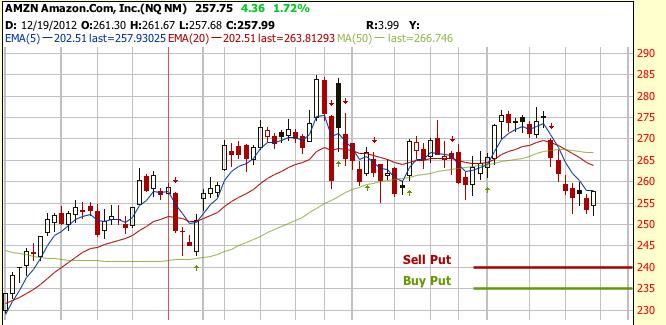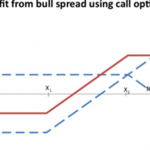Beginning option traders are often enamored with the leverage that options can bring. They are quick to buy a near-term out-of-the-money long call and dream of exploding profits. Unfortunately the likelihood of that happening is low. In my option classes I always start with the basics, and the first trade all beginning traders should focus on is the credit spread.
A credit spread is an option trade where one option is bought, and a nearby option in the same month is sold for more money. The result is there is a net credit – cash is brought into the account. Since options decay over time, you will get to keep the cash when the options expire.
The definition of a credit spread – a pair of options bought and sold where the net premium is a credit to your account – is important. Equally important is the standard application. When traders refer to a credit spread, they are almost always referring to a relatively short-term out-of-the-money options trade. If you think a stock will rise slightly over the short term, you could sell a Put option underneath the stock price, and buy another Put option further below. Since the option that you sell costs more than the option that you buy, there is a net credit to your account.
Let’s look at an example. Suppose you are bullish on Amazon (AMZN). You don’t think it is going to rocket up, but you think it will be up slightly over the next month. With the current price at $257, you sell an April 240 Put option for $1.56 and buy an April 235 Put option for $1.10. The net credit is $.46. If AMZN stays above $240 for the 35 days until expiration, both options in the credit spread will expire worthless, and you will keep the $.46. If you had sold 10 spreads, you would make $460 (.46 x 100 x 10) in 35 days.
There are five ways a stock can move: up a lot, up a little, flat, down a little, or down a lot. The beauty of the credit spread is that AMZN doesn’t have to go up a lot, a little, or even stay flat to make the profit. It can actually go down a little, even down 7% to $240, and you still make your $460. If AMZN does rise, as you expect, you will make the $460 even faster. These short-term, safe, income-producing credit spread trades should be a foundation of your trading strategy.
Submitted by John Marsland
Related Posts
Also on Market Tamer…
Follow Us on Facebook


 Why Meta Platforms Stock Flopped on Friday
Why Meta Platforms Stock Flopped on Friday